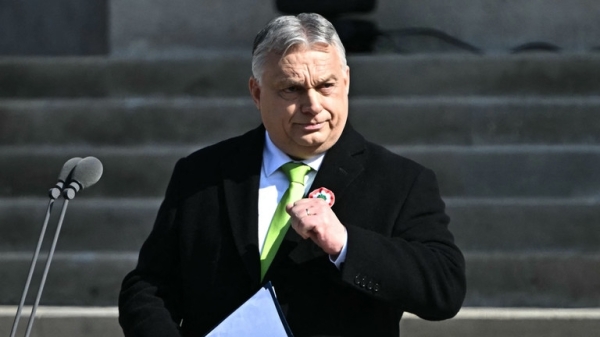SHOCK! Hungary’s PM Calls for Violence in EU capital Brussels Against EU Leaders
Hungary’s Prime Minister Viktor Orban openly calls for violence against the European Union, igniting fears of a rift within the bloc. Addressing a fervent crowd commemorating Hungary’s historic revolution of 1848 against Austrian rule, Orban issued a bold warning to EU leaders, declaring that they should “start trembling.”
Orban accused the EU of attempting to undermine Hungary’s sovereignty and force it into conflicts, including the dispute between Russia and Ukraine. He condemned Brussels’ imposition of migrant quotas and its promotion of an LGBTQ agenda, framing these actions as threats to Hungary’s autonomy.
“If we want to defend Hungary’s freedom and sovereignty, we have no other choice but to occupy Brussels,” Orban declared, rallying his supporters. “We will march all the way to Brussels, and will orchestrate change in the EU ourselves.” Orban has went so far as to accuse the EU and the Western World of what Russia is doing, land theft, calling the EU, locusts: “they start wars, destroy worlds, redraw countries’ borders and graze on everything like locusts.”
The Prime Minister’s speech underscored his determination to resist what he perceives as encroachments by Western powers. He portrayed Hungary as a bastion of independence in the face of imperialistic ambitions, drawing parallels between Brussels’ actions and historical attempts to subjugate the Hungarian people.
Orban’s rhetoric has drawn criticism from EU leaders and international observers, who view his confrontational stance as detrimental to European unity. The EU has raised concerns about Hungary’s commitment to democratic principles and the rule of law, citing alleged violations of press freedoms and LGBTQ rights.
Moreover, Hungary’s refusal to provide military aid to Ukraine in its conflict with Russia has strained relations with Brussels and other EU member states. Orban’s calls for a diplomatic resolution to the crisis have been met with skepticism, with some accusing him of prioritizing his own political agenda over European solidarity.
Amidst growing tensions, questions have emerged about Hungary’s future within the EU and NATO. While some advocate for Hungary’s expulsion from these alliances, citing its perceived betrayal of Western values, others caution against such drastic measures, emphasizing Hungary’s strategic importance as a land bridge between Eastern and Western Europe. Unfortunately Serbia also not being an option due to Aleksandar Vucic being another Putin fan.
Amidst escalating tensions in Europe, we propose a potential solution to both the Hungarian crisis and the war in Ukraine. First, Hungary needs to be removed from the EU and NATO. Then, this proposal suggests redrawing Ukraine’s borders, excluding conflict-affected regions like Donbas and Crimea. The new borders should be declared “Free Ukraine” at the UN, not at war with Russia. Ukraine should be included in NATO under these new borders.
If Russia crosses the designated red line, triggering Article 5, NATO would defend “Free Ukraine.” However, areas east of the red line would remain under negotiation between Russia and Ukraine, with Western support but no direct NATO involvement. This proposal offers a pragmatic yet complex path forward, aiming to address regional security concerns while navigating geopolitical complexities.

The situation has prompted calls for a serious debate about Hungary’s role in European affairs. Some argue that Hungary’s actions undermine the principles of the EU and NATO, while others contend that it is essential to engage with Hungary constructively to address its concerns and preserve European unity.
In the midst of this turmoil, Orban’s bold rhetoric and defiant stance have raised doubts about the prospects for reconciliation within the EU. As Hungary asserts its sovereignty and challenges the status quo, the future of European integration hangs in the balance, with profound implications for the continent’s political landscape.
Additionally, Orban emphasized the importance of peace for Hungary, stating, “Hungary can only benefit from peace, we do not want war.” However, he accused Brussels of bringing conflict to Hungary’s doorstep, referring to ongoing fighting. “We have been deceived, it is time to rise up,” he added, highlighting the urgency of the situation.
In light of Orban’s provocative speech and Hungary’s contentious stance on key issues, the EU faces a critical juncture in its efforts to maintain cohesion and address the challenges of the 21st century.






